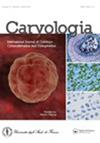奈及利亚西南部雌雄同体的细胞遗传学研究
IF 2.1
4区 生物学
Q2 Agricultural and Biological Sciences
引用次数: 0
摘要
对尼日利亚西南部的一种名为Andropogon gayanus-Andropogon tectorum复合体(Poaceae)的植物进行了染色体数目和减数分裂动力学的研究。这包括使用标准程序进行减数分裂染色体和花粉研究。对A. gayanus (2n = 40)和A. tectorum (2n = 20,40)标本的形态和减数分裂行为进行了研究。细胞遗传学研究表明,该虫的染色体构型为四倍体(2n = 40),基本染色体数为10。a . tectorum是正常的二倍体,染色体数目为2n = 20,是在Ekiti州发现的唯一物种。发现“基瓦尼”为多倍体。染色体数目为2n = 40的顶蕨。这项研究还建立了雄尾龙复合体基因组的稳定性。尽管存在单价和多重结合,但减数分裂保证了高百分比的花粉粒。“基瓦尼”的花粉(>35µm)的花粉模态大小普遍大于其他材料,而盖菊和盖菊的其他材料的花粉模态大小均小于35µm,尽管盖菊材料的花粉模态大小普遍较小。本研究认为,四倍体(2n = 40)在AT10,“Kiwani”的发生可归因于在一个孤独的植物中发生的无融合。本文章由计算机程序翻译,如有差异,请以英文原文为准。
Cytogenetic studies in the Andropogon gayanus-Andropogon tectorum Complex in Southwestern Nigeria
The studies were carried on accessions of the Andropogon gayanus-Andropogon tectorum complex (Poaceae) in southwestern Nigeria to determine the chromosome numbers and meiotic dynamics in the species. This involves meiotic chromosome and pollen studies using standard procedures. Studies on the morphology and meiotic behaviour of collections of A. gayanus (2n = 40) and A. tectorum (2n = 20, 40) have been made. The cytogenetic studies show that the chromosome configuration of A. gayanus is a tetraploid (2n = 40) on a basic chromosome number of 10. A. tectorum occurs as a regular diploid on a chromosome number of 2n = 20 and it is the only species found in Ekiti State. Accession “Kiwani” was found to be a polyploid. A. tectorum with a chromosome number of 2n = 40. This study has also established the stability of the genome of the Andropogon complex. In spite of the occurrence of univalent and multiple associations, meiosis ensures a high percentage of pollen grains. The pollens of accession “Kiwani” (> 35 µm) were generally larger than those of other accessions while the other accessions of both A. gayanus and A. tectorum have modal pollen sizes less than 35 µm, although the A. tectorum accessions were generally smaller. The study concluded that the occurrence of the tetraploid (2n = 40 in accession AT10, “Kiwani” can be attributed to apomixis occurring in a lonely plant.
求助全文
通过发布文献求助,成功后即可免费获取论文全文。
去求助
来源期刊

Caryologia
生物-遗传学
CiteScore
1.60
自引率
23.80%
发文量
26
审稿时长
12 months
期刊介绍:
Caryologia is devoted to the publication of original papers, and occasionally of reviews, about plant, animal and human karyological, cytological, cytogenetic, embryological and ultrastructural studies. Articles about the structure, the organization and the biological events relating to DNA and chromatin organization in eukaryotic cells are considered. Caryologia has a strong tradition in plant and animal cytosystematics and in cytotoxicology. Bioinformatics articles may be considered, but only if they have an emphasis on the relationship between the nucleus and cytoplasm and/or the structural organization of the eukaryotic cell.
 求助内容:
求助内容: 应助结果提醒方式:
应助结果提醒方式:


